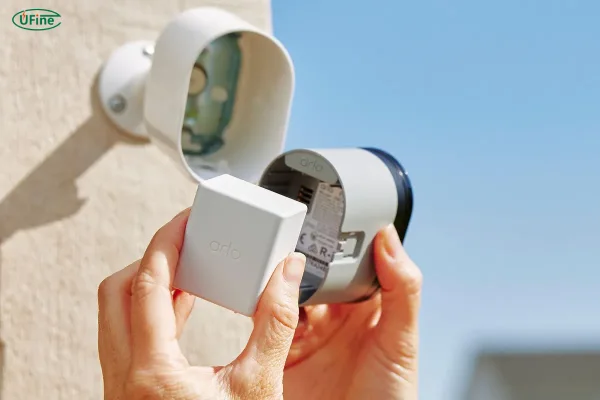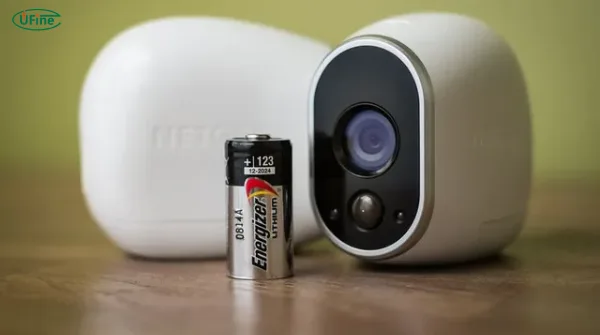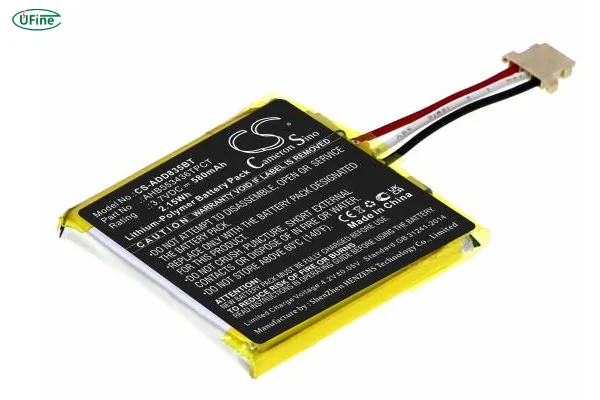
- Part 1. Why the battery matters in security cameras
- Part 2. Types of security camera batteries
- Part 3. Built-in battery vs. replaceable battery
- Part 4. Battery capacity and runtime explained
- Part 5. How long do security camera batteries last?
- Part 6. Charging methods and time
- Part 7. Benefits of lithium batteries for security cameras
- Part 8. How to replace a security camera battery
- Part 9. How to extend the life of a security camera battery
- Part 10. Common battery issues and how to fix them
- Part 11. Best security cameras with long battery life
- Part 12. Conclusion
Part 1. Why the battery matters in security cameras
In the world of modern home and business surveillance, battery-powered security cameras are becoming more popular than ever. Whether it’s for indoor monitoring or outdoor perimeter protection, a security camera battery plays a crucial role in ensuring uninterrupted protection.
A powerful, long-lasting battery ensures that your camera is always watching—even in places where power outlets aren’t available. That’s why choosing the right battery is as important as choosing the camera itself.
Part 2. Types of security camera batteries
Security camera batteries come in several types, each with their own strengths and weaknesses:
- Alkaline Batteries (AA or AAA): Common in budget cameras, but not rechargeable. Frequent replacements required.
- NiMH (Nickel-Metal Hydride) Rechargeable Batteries: Eco-friendly and reusable, but lower energy density.
- Lithium-Ion (Li-ion) Batteries: Most widely used today. High capacity, lightweight, and long-lasting.
- Lithium-Polymer (Li-Po) Batteries: Slimmer and more flexible than Li-ion. Excellent for compact camera designs.
Among these, lithium batteries have become the gold standard for wireless security cameras because of their power, size efficiency, and lifespan.
Ufine Battery specializes in custom lithium battery solutions, including Li-ion and Li-Po types tailored for security cameras. Whether you need high-capacity packs or ultra-thin formats, Ufine can design and manufacture batteries to meet your unique surveillance needs. Contact Ufine Battery today to discuss your battery requirements.
Part 3. Built-in battery vs. replaceable battery
Security cameras either come with built-in batteries or support removable/replaceable batteries. Let’s break down the pros and cons.
Built-In Batteries
- Compact design
- Often USB or magnetic charging
- Less hassle with battery swaps
Downside: When the battery dies permanently, you may need professional servicing or a full replacement.
Replaceable Batteries
- Easy to swap without downtime
- Compatible with external charging docks
Downside: Slightly bulkier design and more user involvement.
For long-term flexibility, many professionals prefer cameras with replaceable lithium batteries.
Part 4. Battery capacity and runtime explained
Battery capacity is usually measured in milliamp-hours (mAh). The higher the mAh, the longer the battery can power the device.
Here’s a rough estimate of runtime based on battery capacity:
Battery CapacityApproximate Runtime (standby & motion-triggered recording)3000mAh2–3 weeks5200mAh4–6 weeks10000mAh2–3 months
Note: Real-world results depend on usage, motion detection frequency, and temperature.
High-definition recording, constant live streaming, and nighttime infrared LEDs can reduce battery life dramatically.
Part 5. How long do security camera batteries last?
There are two aspects to consider: runtime per charge and overall battery lifespan.
- Runtime: Most lithium-powered security cameras last between 2 weeks to 3 months per charge.
- Lifespan: Quality lithium-ion batteries typically last 300 to 1000 full charging cycles.
Cheap off-brand batteries may only last 100–200 cycles, which is why investing in premium lithium batteries pays off in the long run.
Part 6. Charging methods and time
Most wireless security cameras support one or more of these charging methods:
- USB-C or Micro-USB Cable: Standard and easy to use.
- Magnetic Charging Dock: Found in brands like Arlo.
- Solar Panel Charging: A sustainable option for outdoor cameras.
Charging time varies by capacity and input power. Here’s a quick guide:
Battery CapacityCharging Time via 5V/2A Adapter3000mAh~2 hours5200mAh~3–4 hours10000mAh~5–6 hours
Solar panels may take longer but provide continuous charging with sunlight.
Part 7. Benefits of lithium batteries for security cameras
Lithium batteries outperform other types in several key ways:
- High Energy Density: Longer usage with smaller size.
- Low Self-Discharge: Holds charge for months when idle.
- Temperature Resilience: Works well in both cold and hot climates.
- Rechargeable: Reduces waste and long-term costs.
- Lightweight: Ideal for mounting and portable setups.
Ufine Battery manufactures high and low temperature lithium batteries, ideal for outdoor security cameras exposed to extreme environments. Whether you’re mounting cameras in cold storage facilities or desert-like conditions, Ufine has a battery that works reliably.
Part 8. How to replace a security camera battery
Replacing a battery depends on the design of your security camera.
For Replaceable Battery Cameras:
- Open the battery compartment.
- Remove the old battery pack.
- Insert a fully charged, compatible lithium battery.
- Secure the cover and power on the device.
For Built-In Battery Cameras:
- Unscrew or open the device housing (if allowed).
- Disconnect the battery from its plug or circuit.
- Replace with an identical lithium battery.
- Reassemble and charge fully.
Caution: If your camera has a sealed design, it’s best to consult the manufacturer or use professional help.
Ufine Battery offers custom-sized lithium batteries that can be used to replace or upgrade your camera’s original battery. If you can’t find a perfect match, Ufine can help create one based on your specs.
Part 9. How to extend the life of a security camera battery
You can take several steps to maximize both runtime and long-term battery health:
- Use Motion Detection: Avoid 24/7 recording to save power.
- Adjust PIR Sensitivity: Reduce false triggers to conserve battery.
- Disable Unused Features: Turn off sound, lights, or sirens unless needed.
- Install in Shade: Avoid overheating from direct sunlight.
- Use Solar Backup: Keeps your battery topped off naturally.
- Update Firmware: Some updates optimize power efficiency.
Implementing just a few of these tips can double your battery performance in real-world usage.
Part 10. Common battery issues and how to fix them
1. Battery Drains Too Fast
- Adjust camera sensitivity
- Reduce recording resolution
- Check for firmware updates
2. Camera Won’t Charge
- Try a different cable and adapter
- Clean the charging contacts
- Ensure proper temperature range (not too hot/cold)
3. Swollen or Leaking Battery
- Stop using immediately
- Replace with a certified lithium battery
- Dispose of properly
4. Battery Not Recognized
- Reset the camera
- Reinstall battery
- Check for corrosion or damage
With Ufine Battery’s strict quality control and custom engineering, users get reliable lithium batteries that perform consistently across charging cycles and harsh conditions.
Part 11. Best security cameras with long battery life
If you’re still deciding on a camera, here are some top options with excellent battery performance:
- Arlo Pro 5S – 6-month battery life, solar-ready
- Reolink Argus 3 Pro – 5200mAh, solar panel support
- Blink Outdoor – 2 AA lithium batteries, up to 2 years
- EufyCam 2C Pro – 180-day battery life per charge
Choose a camera that suits your environment and surveillance needs. Remember, battery capacity and efficiency matter just as much as video quality.
Part 12. Conclusion
A reliable security camera battery ensures peace of mind. Whether you’re guarding a home, office, or remote area, your camera is only as good as the battery inside it.
From lithium-ion to lithium-polymer, each battery type offers unique benefits. And with the increasing demand for wireless, solar, and portable surveillance solutions, choosing the right battery is more important than ever.
Ufine Battery provides high-quality, customizable lithium battery solutions for a wide range of applications—including security cameras. With advanced production capabilities and strict safety standards, Ufine is the go-to supplier for OEMs, installers, and DIY enthusiasts.
Related Tags:
More Articles

Battery Load Test: A Comprehensive Guide
Step-by-step battery load test guide for car, solar & industrial use. Learn how to load test a battery, interpret voltage charts, and avoid common mistakes.
The Comprehensive Guide to Battery Balancing and Battery Balancer
Discover how battery balancers improve lithium battery performance, lifespan, and safety. Learn types, functions, and tips to choose the right balancer.
What Is the Best Voltage for a Chainsaw Battery?
Compare 12V-80V chainsaw batteries for light pruning, medium firewood, and professional cutting. See best battery chainsaw with runtime charts and safety tips.
Lithium VS. Alkaline Batteries: A Comprehensive Comparison
Lithium batteries last 3–7× longer than alkaline and perform better in cold weather. Compare lifespan, cost, safety, and best uses to choose the right battery.
Comparing Lithium-Sulfur and Lithium-Ion Batteries: Which is Right for You?
Compare lithium-sulfur (Li-S) and lithium-ion batteries on energy, lifespan, cost, safety, and applications. Best choice for drones, EVs, and electronics.





